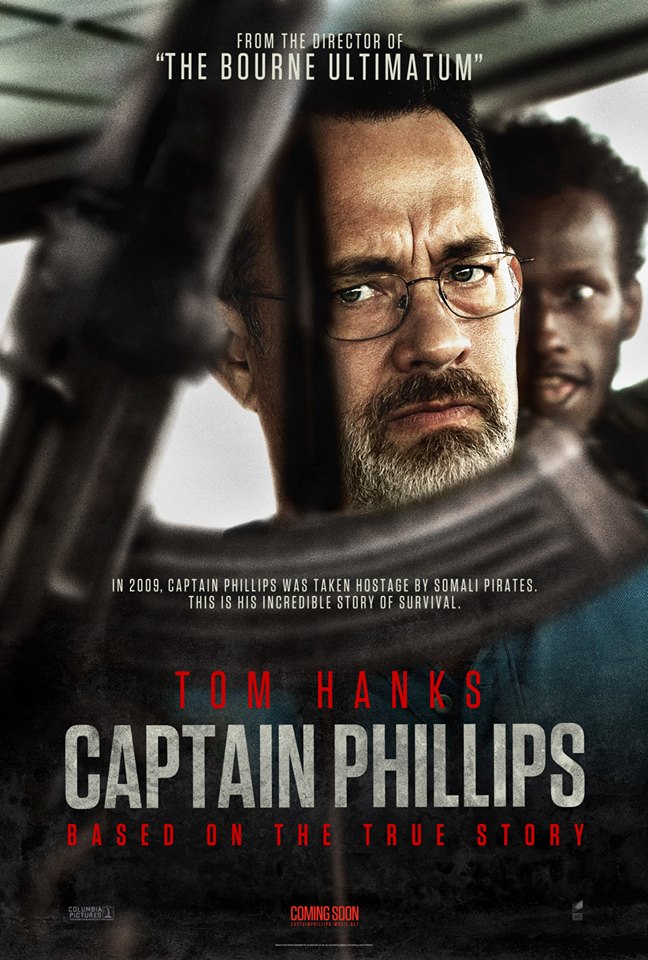Captain Phillips is the new film from British director Paul Greengrass. Much like Greengrass’ unsettling masterpiece United 93 and Bloody Sunday, Captain Phillipsis a blend of reconstructive drama and Hollywood thriller. This is uncompromising, claustrophobic cinema that will have you yearning for the shore.”
In April 2009, the Maersk Alabama set sail for Kenya carrying cargo which included relief food for the famished region. The vessel is under time constraints and opts to sail away from a herd of ships and travel alone along the dreaded Somali basin. These are known as some of the most dangerous waters in the world and the Alabama is set upon by four Somali pirates. Captain Rich Phillips (Tom Hanks) desperately tries to fend off the hijackers but his ship is boarded and they are held hostage. Phillips must use his guile to protect his crew and save himself – especially when he is taken prisoner.
This is nerve shredding cinema at its finest and screenwriter Billy Ray’s script gives the audience very few moments to catch its breath once the pirates set sail on the Alabama. Despite knowing the outcome of this real life event, Greengrass ups the ante in tension by adopting the verité approach again which is much his calling card. There are sets it seems, these are real and cramped locations with very little room for manoeuvre.
The film is anchored (ship pun intended) by a riveting performance by Tom Hanks – his best in years. Although we get very little time with the character before the ship sets sail we do learn about the man while doing his rounds on deck. We get a sense of Phillips’ character when he rigorously puts his crew through drills; quietly telling the men their coffee break is up; or simply wiping his feet before entering the ship. Phillips is serious, stern, authoritative and ultimately – heroic. Hidden behind glasses, a wolfish goatee and an extra kilo or two in weight, Hanks is far from recent misfires like Larry Crowne and Extremely Loud & Incredibly Close. Phillips’ heroism and courage comes not from Hollywood clichés but from a real human being faced with an extraordinary life or death situation. Hanks’ performance for the last 20 minutes alone should secure him a Best Actor nomination for this year’s Academy Awards.
The film’s real achievement, however, is in its portrayal of the Somali pirates. Their story is paralleled to Phillips’ and his crew showing the dark and harsh conditions of their lives. Barkhad Abdi gives a thoughtful performance as Pirate leader Muse, who imbues his character with much more sympathy than is anticipated. Muse and his crew are under the thumb of a brutal warlord who coerces young men to go out to steal and possibly kill for money on the unforgiving Somali basin. Much like United 93’s plane hijackers, Muse and his men are far from cool and collected James Bond villains. They are desperate, panicked and ultimately terrifying as the pressure and stakes are exasperated. These pirate are not fiendish cartoon villains, nor are they entirely sympathetic, but they are human beings pitted against bleak and uncompromising circumstances. Phillips who establishes a connection with Muse at one point begs him to surrender but Muse’s position is helpless – he has “gone too far”.
The film is not, however, without it’s trivial but noticeable flaws. For instance, the opening scene limps along with Phillips and his wife (the wasted Catherine Keener) having a disappointingly flat conversation about the world changing and how the times they-are-a-changing. Ray’s dialogue hits a bum note in an otherwise tightly-woven screenplay. Speaking of bum notes, Henry Jackman’s score bears an alarming resemblance to Hans Zimmer’s work in The Dark Knight and Inception. The climactic piece of the film is almost identical to Inception’s closing score which is, if nothing else, an unwelcome distraction over a very powerful performance from Hanks.
These are minor quibbles however. Greengrass and Ray have crafted a superb and thrilling picture. From an early shot of the Alabama centre of frame surrounded by miles and miles of isolating ocean to the heart-pounding finale – this is knife-to-the-jugular cinema. It has technical achievements that are wonderfully rewarding on a superficial and entertainment level – but it is those issues of social injustice that are pressed that will leave you bobbing long after the credits roll.


